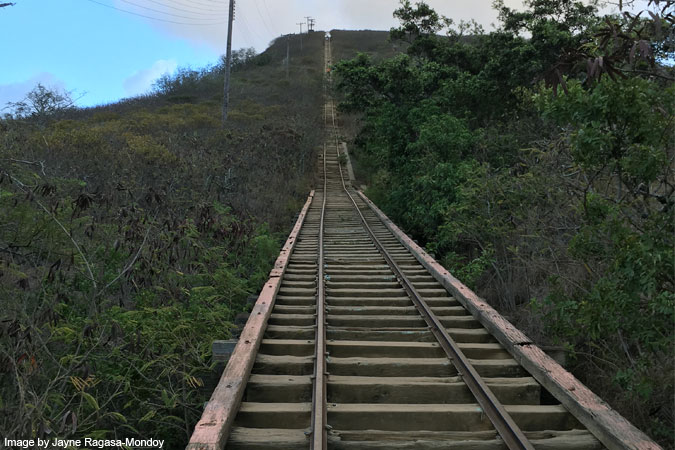
The Wai’anae and Ko’olau volcanic mountain ranges flank the Hawaiian island of Oahu. Miles of scenic hiking trails wind through their ancient forests and majestic peaks. Some trails are easy and child-friendly, others steep and strenuous. One trail in particular requires great stamina to conquer: the Koko Head Crater Steps. The stairs (pictured above) are remnants of railroad ties from the World War II era, built to haul munitions to the crater’s 1,200-foot summit. It’s a rigorous, steep climb of about 1,100 uneven, gravelly, often knee-high steps.
The challenge is exhilarating. Elite athletes are able to reach the summit in under 30 minutes; some folks need two hours; still others decide to turn around and try another day. Whatever one’s pace, to achieve success on the Steps one must know the terrain, have a positive outlook in the face of challenge, and be in proper physical conditioning. In other words, one must possess a balance of knowledge, attitude, and skill.
This balance is also essential in cultivating catechists. Learning (for ourselves and our students) is best when approached holistically across three domains: cognitive (knowledge), affective (attitude/sense of being), and behavioral (skill/doing). Along these lines, in the General Directory for Catechesis #238, the bishops of the Church tell us that formation, especially for catechists, must be three-dimensional, covering the areas of “knowing, being, and savoir-faire (a style of doing).”
Know the Terrain: Cognitive Domain/Knowledge
Take the time to study and reflect upon Sacred Scripture and Church doctrine—especially the Catechism of the Catholic Church—as well as the topics you are assigned to teach. Know your students and ensure your lessons are age-appropriate. Be systematic in your planning to ensure your teaching reflects Christ alive and is doctrinally sound, not based primarily on personal preference and information learned in years past. Your catechetical leader is the “veteran hiker” who knows the terrain, so remember to communicate with her/him regularly.
Have a Positive (Christ-like) Outlook: Affective Domain/Attitude
Prayer and frequent participation in the Sacraments of Reconciliation and Eucharist are essential to our ministry. In them, Christ himself shapes our outlook through his grace, redemption, and nourishment and fills us with his love. Lean on his Spirit should your energy or enthusiasm wane.
Proper Conditioning: Behavioral Domain/Skill
Being a great catechist takes work! Having spent time in prayer and study we must then discipline ourselves to prepare and teach our lessons. Teacher guides, while excellent resources, still require us to master a “style of doing” to enliven the content and flow of the lesson. But as in proper physical conditioning, as we become accustomed to the necessary rigor of lesson preparation and teaching, the more enjoyable it becomes.
My ascent of Koko Head Crater was arduous and a lesson in humility. It took an enormous amount of determination to adapt to new information (knowledge), my shifting motivation (attitude), and sometimes questionable strength (skill) in my quest to reach the summit. Reflecting on my experience, I am reminded that even as we strive for balance in our ministry, the journey of evangelization and catechesis is very human: it is alive and dynamic; it requires determination. Yet God has called us to climb his mountain, and God walks with, encourages, and nourishes us as we make the ascent. The climb is worth the effort, and the view at the summit is heavenly.




Great article. I will use it to help me do better with my 7th graders Religious Ed Class. Ed Klein, Espiritu Santo Catholic Church, Safety Harbor, FL Boston College, M.Ed., 1964